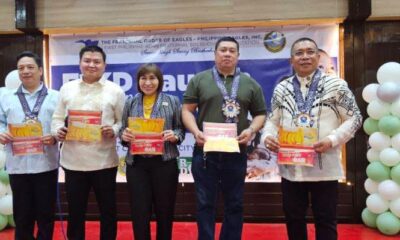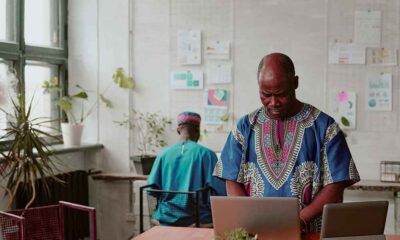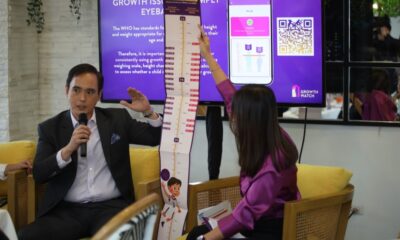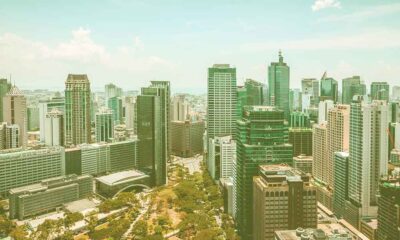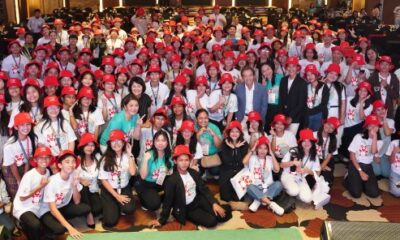News
Clean Water for Healthier Lives
How important is water in helping children live healthier lives? Recent data from the World Health Organization and the United Nations’ Children’s Fund’s Joint Monitoring Programme for Water Supply, Sanitation, and Hygiene shows that while 91% of Filipinos have access to basic drinking water services, only 61% are using drinking water facilities that are accessible on their premises.
In rural areas, this number drops to 47%, calling into question how many Filipinos have reliable access to safe drinking water.
“Hydration is one of the key habits necessary to living a healthier life,” notes Nestlé Philippines Senior Vice President for Communication, Marketing, and Innovation Paolo Mercado. “In a country where millions of schoolchildren are battling malnutrition, we need to ensure that families and communities across the country can provide their children with clean drinking water. ”Non-profit organization Waves For Water aims to bridge this gap and provide access to safe drinking water to communities across the Philippines.
As one of the contributing organizations under the Nestlé Philippines’ United for Healthier Kids program, Waves For Water aims to make drinking water more accessible so schoolchildren can retain nutrients critical to their growth, development, and long-term health.
“Access to clean water plays a vital role in addressing malnutrition,” shared Waves For Water Country Director Carlo Delantar. “A family with access to clean water and nutritious food will mean kids not having to excuse themselves from school due to sickness, therefore receiving proper education. It means parents can devote more time to work and making a living, instead of walking long distances to fetch water or also getting weak and sick.” Delantar was instrumental in facilitating Waves For Water’s initial work in the Philippines seven years ago, in the aftermath of Typhoon Yolanda. The lack of access to safe drinking water post-disaster opened his eyes to the gaps still present in communities across the country.
“The lack of access to clean water can be due to one or a combination of the following factors—a disaster that would cut infrastructure like pipes and hoses, a contaminated water source, or the distance between a clean water source and the community,” noted Delantar. “This makes children and the elderly especially vulnerable to water-borne diseases.”
Waves For Water aims to make clean water more accessible to more Filipinos, through using a lean, collaborative approach to installing community-based water systems, restoring wells, and providing rainwater catchments in areas where groundwater is unavailable.
Interested donor-volunteers can sign up to their Clean Water Courier program to distribute water filters to an area. They then undergo basic training on the use and maintenance of filter and go through a ‘train the trainers’ session so they can pass on their knowledge to partner communities.


Waves for Water’s basic water filter package consists of a clean bucket, a 0.1 micron Absolute filter, a bucket adapter kit and hole cutter, a filter cleaner and filter hanger, and adapter hose. Each kit serves 100 people and can filter up to one million gallons of water. Waves for Water offers the kits as a solution for areas where the necessary WASH infrastructure has yet to be built or completed.
Each filter can serve up to 100 people and filter as much as one million gallons of water for up to five years. Their filter uses one of the highest filtration rates available and at 0.1 micron absolute, it keeps out bacteria, protozoa, and cysts which could lead to waterborne diseases such as cholera, botulism, typhoid, E.coli, salmonella, streptococcus, and amoebic dysentery.
In addition, Waves For Water organizes education sessions for children, parents, and community members to help them appreciate the value of water, sanitation, and hygiene (WASH) and WASH facilities.
To date, some 10,000 water filtration systems have been distributed across the country, covering areas such as Bohol, Siquijor, Palawan, Leyte, Baguio, Mindoro, Bicol, Samar, Batanes, and the Calayan Group of Islands, benefitting around one million Filipinos.
“Since we started, our partner communities have reported a decrease in classroom and workplace absenteeism, increased school attendance, reduced physical injuries from heavy lifting, and even household savings, as they no longer have to purchase water for drinking, bathing, and cleaning,” said Waves For Water Director of Operations Jenica Dizon. “For the children, it allows them to stay in school and actively participate in their education. For the adults, they can reallocate the time they spend fetching clean water to their livelihood or to community work.”
For 2018, Waves For Water is looking at expanding to more coastal areas and mountain regions. With the rainy season bringing about floods and typhoons, Delantar and Dizon hope to help more communities secure regular access to safe drinking water.


Upon identifying a beneficiary community, Carlo Delantar, Jenica Dizon, and volunteers visit the community to learn more about their needs and to teach community members how to install, clean, and maintain the water filter. These demonstrations have helped reduce the cost of maintenance and replacements and improved the lifespan of the water filter.
Interested donor-volunteers can purchase an MVP filter and a water bucket for Php2,750 and donate Php27,250 for 10 water filter systems for a community. They can email Jenica Dizon at jenica@wavesforwater.org and Carlo Delantar at carlo@wavesforwater.org.



